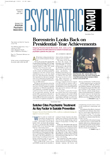With great dismay I continue to read the continuous attempts by our psychologist colleagues to obtain a legal foothold in prescribing privileges around the country, the most recent being a near victory by them in New Mexico (Psychiatric News, April 6). This seems an endless issue that comes up again and again, year after year.
In general it seems that our membership is rather passive about this issue, and only because of the watchful eye of certain of our leaders is this serious problem ever addressed. It seems that the state psychiatric societies are the ones “stuck” with the problem, when in fact the problem would rapidly spread to the other states once the first state passes such a law.
The issue of psychologist prescribing gained momentum in the 1980s, when for a brief period certain Army psychologists were given training in the writing of prescriptions. This was stopped after a few years due to the impractical nature of the final product and the sense that there were sufficient numbers of psychiatrists and primary care doctors to appropriately write such prescriptions. It was this program, however, that was then used as a reference point for psychologists in the civilian sector to cite to their legislators that psychologist prescribing has real credibility.
Logic alone is not working with legislators when our mental health groups attempt to lobby them. Often it seems that those lobbying are pulled from the local area and under great duress and with little time to prepare adequately. The American Psychological Association is bigger and better financed than we are and has consistently shown that its members work quietly and for long periods preparing their case before legislative bodies in any given state. It is critical to our specialty and the public at large that we establish a national watchdog group of our APA colleagues to monitor these activities nationwide and develop a well-reasoned team approach that would be of immediate assistance to our colleagues in any given state so that the wheel doesn’t have to be reinvented every time legislation is proposed at the state level. Additionally a way must be found at the national level to establish policy that makes it illegal for nonmedically trained personnel to be in any way involved in the dispensing of drugs. To think that one can be adequately prepared to understand the subtleties and complexities of prescribing with no medical training except for 300 hours of education makes a mockery of medical education and puts the public at great risk. We all must share in this serious matter and give of our time, resources, and wisdom.
